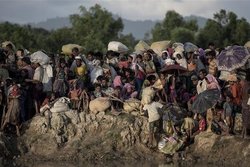 The European Union (EU) has extended sanctions, including a weapons embargo, against Myanmar for one year over the Myanmarese military’s deadly crackdown on minority Muslims in the country.
The European Union (EU) has extended sanctions, including a weapons embargo, against Myanmar for one year over the Myanmarese military’s deadly crackdown on minority Muslims in the country. RNA - The European Council said in a statement on Monday that the sanctions included restrictions on arms, dual-use products, and surveillance equipment that could be used for “internal repression” in Myanmar’s Kachin, Rakhine, and Shan states, where minority Rohingya Muslims have been subjected to state-sponsored violence.
“The sanctions regime includes an embargo on arms and equipment that can be used for internal repression, an export ban on dual-use goods for use by the military and border guard police, and export restrictions on equipment for monitoring communications that might be used for internal repression,” the Council said in the statement.
The EU also extended sanctions on 14 senior military and border officials over human rights violations, including killings and sexual violence. The measures bar them from traveling to or through the European bloc and freeze any assets they hold in Europe.
Under the sanctions, the EU will also be refusing to train soldiers from Myanmar.
The measures will stay in place until at least April 30, 2020.
The statement referred to the findings of the independent international fact-finding mission (FFM) of the UN Human Rights Council, which “concluded that gross human rights violations were committed in Kachin, Rakhine and Shan States, in particular by the Myanmar Armed Forces (Tatmadaw)” and urged the government of Myanmar “to take, without further delay, meaningful action and to make progress in all areas of concern set out” in its previous conclusions of February 26, 2018.
The Rohingya Muslims in Myanmar have faced horrific violence since 2012. In 2017-18, Rakhine State in particular was the scene of an organized crackdown committed against the Muslims by the country’s military and Buddhist mobs. Thousands of Muslims were killed in that crackdown and some 800,000 Rohingya fled to neighboring Bangladesh, where they currently live in camps in dire conditions.
The violence in Rakhine has been described by the United Nations as genocide.
Last year, a UN fact-finding mission said the campaign against the Rohingya was orchestrated with “genocidal intent.” It urged charging the Myanmarese army chief and five other generals with the “gravest crimes under international law.”
The International Criminal Court (ICC) has already opened a preliminary examination of the violence.
While the Myanmarese military has escaped all accountability in that campaign of violence, new reports have been emerging about potential rights violations against suspected Buddhist rebels as well.
847/940